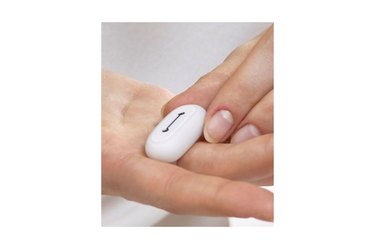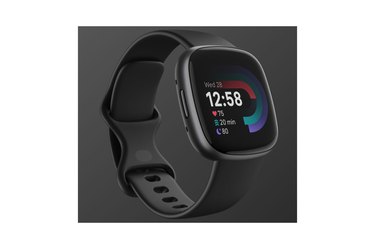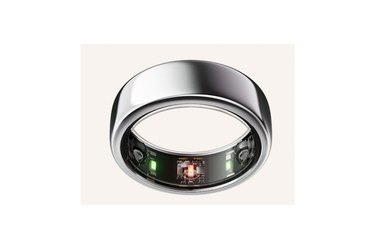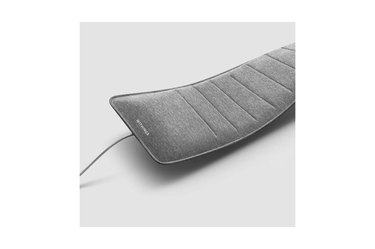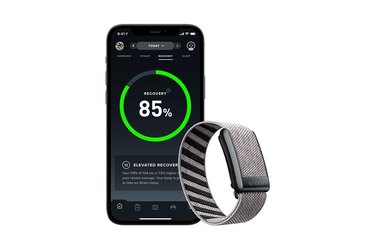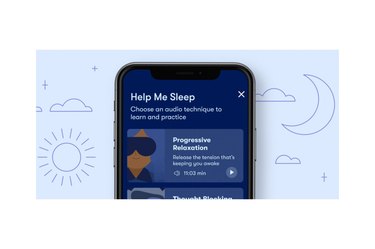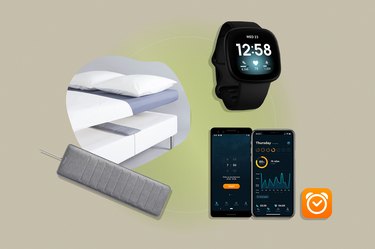
In a perfect world, everyone would sleep well, night after night. But in reality, many of us struggle to get the zzzs we need. That's where using one of the best sleep trackers of the year can come in handy.
Whether in the form of an app, wearable device or under-the-mattress pad, a tracker detects movement and, in some cases, measures other biomarkers (like heart rate) while you sleep.
Video of the Day
Video of the Day
Using that information, it can assess your overall quality of rest, specifically noting how much time you spend asleep (as opposed to tossing and turning) and how your body cycles through the various stages of your snooze.
How We Chose
The field of sleep monitoring devices is broadening all the time. With that in mind, we've selected the best sleep trackers available now, according to market research.
And with the help of Philip Cheng, PhD, a sleep researcher at the Henry Ford Sleep Disorders and Research Center, we'll provide guidance around what exactly you should look for when shopping for a tracker of your own.
Find more information on how we choose products here.
The Best Sleep Trackers
- Best Overall: Muse S ($339.99, ChooseMuse.com)
- Best on a Budget: SleepOn Go2Sleep ($89, SleepOn.us)
- Best App: Sleep Cycle ($0–$38.99, SleepCycle.com)
- Best Wrist Wearable: Fitbit Versa 4 ($149.95, Fitbit.com)
- Best Ring Wearable: Oura Ring Gen 3 (From $349, Ouraring.com)
- Best Under-the-Mattress: Withings Sleep ($129.95, Withings.com)
- Best for Runners: WHOOP ($30–$324, WHOOP.com)
- Best for Improving Sleep Quality: Sleepio ($0–$359.10, Sleepio.com)
1. Best Overall: Muse S
Pros
- Comes with an app
- Most in-depth sleep information
Cons
- Pricey
- Might be uncomfortable if you don't like wearable devices
Intended to help you drift off and track your slumber once you're out for the night, the Muse S headband is one of the most sophisticated sleep devices on the market. It helps usher you to dreamland with immersive soundscapes and a comfortable design. Meanwhile, it measures your breath, heart rate and brain activity to gauge the quality of your rest.
Users get the data the headband collects — and journal about their snooze sessions — on the Muse sleep tracking app, which is available for both iOS and Android devices.
While the Muse S offers some of the most in-depth information on sleep activity, it comes with a high sticker price.
Buy it: ChooseMuse.com; Price: $339.99
2. Best on a Budget: SleepOn Go2Sleep
Pros
- Budget-friendly
- Comfortable design
- Checks blood oxygen
Cons
- Cannot measure airflow (which can make it difficult to determine sleep apnea)
A more affordable but still high-performing sleep monitor, SleepOn's Go2Sleep tracker monitors heart rate and blood oxygen while you slumber, then provides a thorough analysis of your nighttime habits through its accompanying app.
Despite its in-depth data collection, the Go2Sleep wins extra style points for how lightweight and subtle it is for a wearable sleep tracker.
This device goes beyond the call of a regular monitor and also alerts the user to abnormalities that may be cause for concern — say, if blood oxygen levels drastically change during the night (a possible sign of sleep apnea).
Buy it: SleepOn.us; Price: $89
3. Best App: Sleep Cycle
Pros
- Free to download
- Works from your phone
Cons
- Information may not be as accurate without a wearable device
Some of the reasons why this is among the best sleep tracker apps is because doesn't require additional devices aside from your phone and it's free to download. Just place your phone on your bed or nightstand and read the app's findings on your movement, wakefulness and overall sleep cycle the following day.
The free version of Sleep Cycle offers sleep stats and data graphing, alarm melodies and, for iOS users, integration with Apple Health. Users can opt into a premium subscription for $39.99 and enjoy more in-depth analyses on their long-term sleeping patterns as well as notes on how such factors as caffeine intake, exercise and the weather affect their slumber.
Tip
Looking to get a better night's sleep? See more options in LIVESTRONG.com's guide to sleep apps.
Download it: SleepCycle.com; Price: $0–$38.99
4. Best Wrist Wearable: Fitbit Versa 4
Pros
- Comprehensive health information
- Can track other health measures like heart rate, workout, etc.
Cons
- Pricey
- Can be uncomfortable to wear at night
This smartwatch from Fitbit stands out in the crowded field of wearable activity trackers for its ability to distill complex information on your heart rate and time spent in light, deep and REM sleep into a digestible, daily sleep score, which you can get through the Fitbit app or on the device itself.
Even some of the more practical features on the Fitbit Versa 4 prioritize a good night's rest: Its smart wake capabilities gently rouse users with a vibrating alert, while its sleep mode silences alerts and keeps the watch's screen dark.
Buy it: Fitbit.com; Amazon; Price: $149.95
5. Best Ring Wearable: Oura Ring Gen 3
Pros
- Tracks what sleep stage you are in
- Tracks other health measures like workout recovery, stress etc.
- Stylish
Cons
- Pricey
If you are looking for a wearable tracker that is not only comfortable, but also stylish, the Oura Ring Gen 3 is a great option.
The sensors located on the inside of the ring can track your temperature, heart rate and even how long you spent in each sleep stage — key factors for achieving restful sleep. It can even detect when you take a nap!
Get an Oura membership ($5.99 per month) to track your progress from your phone. Each morning you can check your customized sleep analysis to work toward better sleep.
Buy it: Ouraring.com; Price: From $349 (plus $5.99/month membership)
6. Best Under-the-Mattress: Withings Sleep
Pros
- Easy to set up
- Comfortable
- Tracks breathing rate and snoring
Cons
- Takes about one month to gather sleep pattern data
Sleep tracking mats that sit under your mattress can be more appealing than wearable devices because they're easy to set up and don't rely on you remembering to put something on before bed.
In addition to these general advantages, Withings Sleep, specifically, offers users information on their sleep cycle, heart rate and snoring, delivering a succinct sleep score in the corresponding Health Mate app.
Withings Sleep is also compatible with smart home devices, meaning you can set your home's light and temperature settings to correspond with your bedtime.
Buy it: Withings.com; Price: $129.95
7. Best for Runners: WHOOP
Pros
- Can track other health measures like heart rate, workout etc.
- In-app sleep coach
Cons
- Can be pricey
- May feel uncomfortable to wear at night
This lightweight wrist strap (which comes with an accompanying app) is intended to be worn 24/7 in order to deliver thorough, up-to-date info on the wearer's activity, sleep and, most importantly for runners, recovery — all of which makes it one of the best sleep trackers out there.
WHOOP collects data such as sleep stages, disturbances, heart rate and efficiency, all with optimizing the wearer's athletic performance in mind. Through its in-app sleep coach, WHOOP can recommend how much rest the wearer needs and how they should improve the quality of their slumbers in order to get closer to their goals.
8. Best for Improving Sleep Quality: Sleepio
Pros
- Customizable program
- Access to a sleep expert
Cons
- May not be as accurate as a wearable device
If you're interested in not only tracking your sleep but making slight improvements to it, Sleepio's service is worth a try. Using a questionnaire to gauge the user's current sleep issues and goals, Sleepio creates a custom program intended to address those concerns and make strides toward better shut-eye.
Users track their progress using a sleep diary and check in regularly with Sleepio's virtual sleep expert through the corresponding app. It's compatible with iOS, desktop and wearable activity tracking devices.
Buy it: Sleepio.com; Price: $0–$249, or free with your health insurance
What to Look for in a Sleep Tracker
Cheng says to keep an eye out for these attributes when selecting the best sleep tracker for you:
1. Heart Rate Monitoring
Ideally, your sleep tracker of choice should glean its analyses from more than just your movements throughout the night (more on why that is below).
It's especially helpful if it offers heart rate monitoring, Cheng says, because this info can help the device better determine when you're asleep. Trackers that also measure breathing and respiration will be even more accurate when gauging sleep patterns.
2. Brain Activity Tracking
Trackers with this capability are harder to come by (our best overall pick is one of the few that comes with it), but Cheng says this feature can be very useful in painting a full and accurate picture of the user's sleep health.
3. Comfort
A more practical concern is how you feel using the device. If you choose a wearable tracker that feels cumbersome or tight while you sleep, you won't want to use it. If possible, try it on in-store before making your final purchase, or make sure it has a reliable return policy if you're shopping online.
What to Avoid in a Sleep Tracker
On the other hand, Cheng says these qualities should be a deal-breaker:
1. Only Movement Tracking
Devices that base their analyses solely on movement are not going to be as accurate as ones that measure other types of activity, Cheng says.
This is because, quite simply, the user can be awake but laying very still, and a sleep tracker that lacks features beyond motion detection might not be able to differentiate that state from actual sleep. In turn, it will provide them with imperfect information about their shut-eye.
2. Poor Battery Life
Yet another logistical feature to be aware of is a device's battery life. Cheng points out that it's important to use a tracker that won't lose its charge in the middle of collecting data. It may sound obvious, but it bears mentioning that a monitor that dies in the middle of the night will not deliver correct information.
What Else to Know Before You Buy
Sleep trackers can be a great tool, but if you find yourself hyper-focused on the data to the point that it's causing stress, consider opting for a device that provides less data. And while a sleep tracker can help you reach a specific, incremental goal like increasing your sleeping time from eight to nine hours per night, it can't solve all of your problems, especially if they're on the more severe end of the spectrum.
For example, if you're dealing with insomnia or consistently having trouble staying asleep, Cheng recommends getting in touch with your doctor or a sleep specialist.
"That's not to say that the tracker wouldn't help," he says. "But in that case, you're going to want to have some professional consultation to see what are some goals you want to be aiming for, or what's realistic for where you're at."
If you decide to seek medical care, consider bringing your sleep tracker (or a PDF of its analysis) to your appointment. That kind of professional sleep monitor information can actually provide your doctor with further insight into the issues at hand and, in turn, get you a little bit closer to a good night's rest.
Is this an emergency? If you are experiencing serious medical symptoms, please see the National Library of Medicine’s list of signs you need emergency medical attention or call 911.

